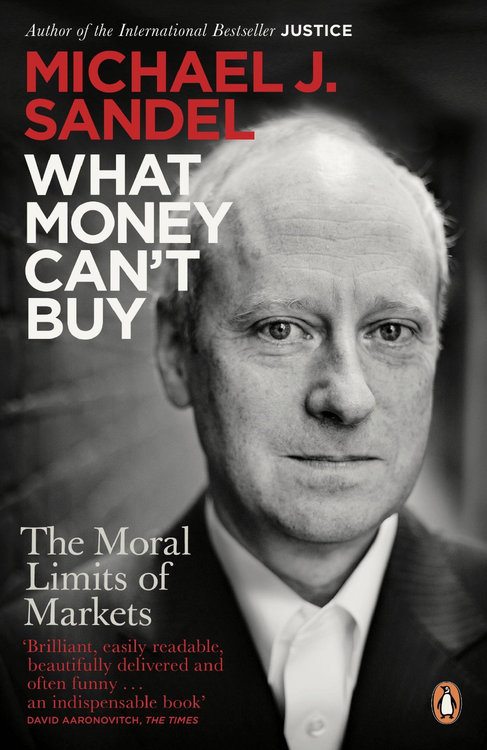Thinking morally about the economy is one of the most important topics of our time. In What Money Can’t Buy: The Moral Limits of Markets, Michael Sandel, professor of government at Harvard University, grapples with the tangible ethical issues where this question becomes most acute. He articulates important concerns in a clear and forceful way. However, he adopts a philosophical framework that limits his ability to connect morality to the economy. Even within that framework, his analyses tend to be one-sided and impressionistic. The result is a book that will no doubt gratify readers who already share Sandel’s assumptions and predispositions but probably frustrate those who don’t.
Americans increasingly feel like their economy has become a morality-free zone. We see it in everything from ethical emptiness in the financial sector to crony capitalism in both political parties, to the search for meaning through material consumption, to the increasing numbers of able-bodied people who refuse to support themselves, to comfortable upper-middle-class white kids who want working single moms to pay off their student loans. It’s clear we need to relearn how to think morally about work, money, and the economy.
Sandel offers What Money Can’t Buy as a first step toward filling this moral void. He focuses on a fairly narrow set of ethical questions: Is it ethical to sell a kidney? To reward good grades with extra allowance money? To buy a script for a wedding toast? To sell advertising space on your body via tattoos? Sandel hopes these questions will reveal the basic assumptions we make, so we can examine them carefully.
With a few exceptions, the motivating concerns that drive What Money Can’t Buy are valid and Sandel does a good job of explaining them for a lay audience. I especially appreciated Sandel’s discussion of how the nature of a thing can change when it is an object of purchase. For example, lots of people would like to be awarded a Nobel Peace Prize; some would like it so much that they’d be willing to pay millions of dollars. But if the Nobel committee actually put the prize up for sale, it would no longer be worth having. Earning it instead of buying it is the only thing that makes it valuable. Or consider the case of gift-giving. Why buy something for the other person instead of just giving cash—surely he knows better what he would want. But while giving cash may be equivalent to buying a gift, it’s not the same in other ways:
Gifts aren’t only about utility. Some gifts are expressive of relationships that engage, challenge, and reinterpret our identities. This is because friendship is about more than being useful to one another. It is also about growing in character and self-knowledge in the company of others. As Aristotle taught, friendship at its best has a formative, educative purpose. To monetize all forms of giving among friends can corrupt friendship by suffusing it with utilitarian norms. (102)
Other valuable lines of discussion include the subtle but morally important distinction between a fine and a fee (a question with lots of timely resonance), and how paying people to do things will “crowd out” other motivations.
Amoral Market?
The deepest problem with Sandel’s approach is his philosophical framework for relating the economy to other forms of social action. Sandel treats the economy as amoral by its very nature. If it’s moral, it’s not the market; if it’s a market, it’s not moral. Thus “markets” and “morality” always exist side by side but in silos, hermetically sealed from one another—or perhaps a better image would be oil and water in a jar, flowing around each other but never mixing.
As a result, the book only considers the moral negatives of the economy and the moral positives of other social forms. Sandel does not examine the other side of the ledger, where economic forces can bring morally good influence to counteract the ways in which other social forms can become dysfunctional and dehumanizing. For example, Sandel complains that selling things arbitrarily privileges those with more money and reinforces economic inequality, but he never considers how the alternative methods of distribution he champions (mostly queues or government planning) also arbitrarily privilege some over others and reinforce other forms of inequality—often in ways that are worse than the market. Government planning arbitrarily privileges the powerful and politically favored. As for queues, Sandel’s assumption that if something is random it must be fair reminds me of Two Face’s final speech in The Dark Knight.

What Money Can’t Buy: The Moral Limits of Markets
Michael J. Sandel
Should we pay children to read books or to get good grades? Should we allow corporations to pay for the right to pollute the atmosphere? Is it ethical to pay people to test risky new drugs or to donate their organs? What about hiring mercenaries to fight our wars? Auctioning admission to elite universities? Selling citizenship to immigrants willing to pay? In What Money Can’t Buy, Michael J. Sandel takes on one of the biggest ethical questions of our time: Is there something wrong with a world in which everything is for sale? If so, how can we prevent market values from reaching into spheres of life where they don’t belong? What are the moral limits of markets?
I’m not saying there’s no case to be made for Sandel’s position on these questions. I’m actually on Sandel’s side on many issues. But Sandel has failed to make his case effectively because his presentation is almost always one-sided.
No Constructive Morality
Moreover, because of this framework Sandel can only offer a negative or critical moral critique; he is unable to offer a constructive morality for the economy. If you tell people markets are intrinsically amoral, as Sandel does over and over again, you implicitly give them permission to be amoral within the sphere of action you’ve labeled as “the market.” This is cleaning the cup on the outside while leaving it dirty on the inside. Like Typhoid Mary, Sandel’s efforts to heal the symptoms of the disease inadvertently spread the disease itself.
Economic action is human action, and human action is always moral. It’s not enough to create boundaries for the market; we have to orient the market toward its proper moral purpose from within. Only this can sustain ethical behavior within the market. It would also be much more effective than Sandel’s approach in maintaining the boundaries between the market and other aspects of life, because this perspective would help us deal with the problem at its source instead of just managing the symptoms.
In fact, you can’t really draw a bright, shining line between “the economy” or “the market” and other ways of distributing social goods. Consider, for example, how the institution of marriage began to fall apart after we started conceiving of it exclusively in terms of sexual union and not in terms of economic union. Marriage only works as an institution if it is simultaneously a union of sexual, economic, and all other aspects of life. The distinction between the economy and the rest of life matters, but the boundaries are always fuzzy in practice. Sandel doesn’t acknowledge this, because his philosophical framework can’t accommodate such ambiguity.
Bad Intuition
Another problem with the book is the impressionistic, subjective way in which Sandel often treats his subject matter. Sandel appeals to moral intuitions without acknowledging that other people’s intuitions may differ. For example, discussing the serious ethical issues involved in letting one person own a life insurance policy on another person, Sandel asserts that “morally speaking, there’s not much difference” between stranger-owned life insurance (a policy taken out by the person himself and then sold to another) and stranger-originated life insurance (where the other person took out the policy in the first place). I disagree; I think there’s a huge difference between selling a life insurance policy you no longer want to a person whom you choose and may have reason to trust, versus someone taking out a policy on a stranger without their knowledge. But Sandel never seriously considers this or any other alternative view.
As an indication of just how subjective and impressionistic the book is, consider that it has no conclusion. Sandel lines up a long list of ethical issues, and when he has pondered the last, the text more or less just cuts off. Sandel owed us something more than a stream of consciousness.
A more surprising omission, coming from a political philosopher, is the failure to ask when and how it’s permissible to enforce one view over another by law when intuitions differ, and who has the authority to make that call. Sandel is absolutely right that we have a big problem with granting permission to assert in our political arguments that one way of life is better than another. However, Sandel swings too far in the opposite direction by simply taking his subjective moral intuitions and recommending policy based on them. If policy flows from intuitions in this way, then either our public morality will be decided by majority vote and imposed on the minority, or else public policy will be guided by the private morality of an elite class. Either way, freedom of religion and the rule of law fly out the window, and we cease to be politically free. We need a way of reasoning together about public morality, but Sandel’s subjective methods can’t provide one.
Finally, Sandel sometimes displays an embarrassing ignorance of basic economic facts relevant to his case. The phenomenon of “concierge doctors,” which Sandel deplores, was created not by any operations of the market but by politicians manipulating Medicare reimbursement rates and a host of other factors. Also off Sandel’s radar are the low-cost, no-insurance-necessary storefront clinics sprouting up nationwide, thanks to the opportunities provided by the market, to redress the lack of access to care Sandel worries about—and which is in part caused by some of the same policy interventions Sandel favors, because they drive up the cost of insurance.
I really wanted to be able to recommend this book, even if I disagreed with its philosophical approach. Sandel is right that the debate on these issues can only do us good. If my differences with Sandel were only philosophical, I would urge people interested in this discussion to buy and read this book, but also to read others that come from a different point of view. In the end, however, Sandel’s subjective intuitionism and one-sided presentation of the issues prevents me from recommending his work.




































